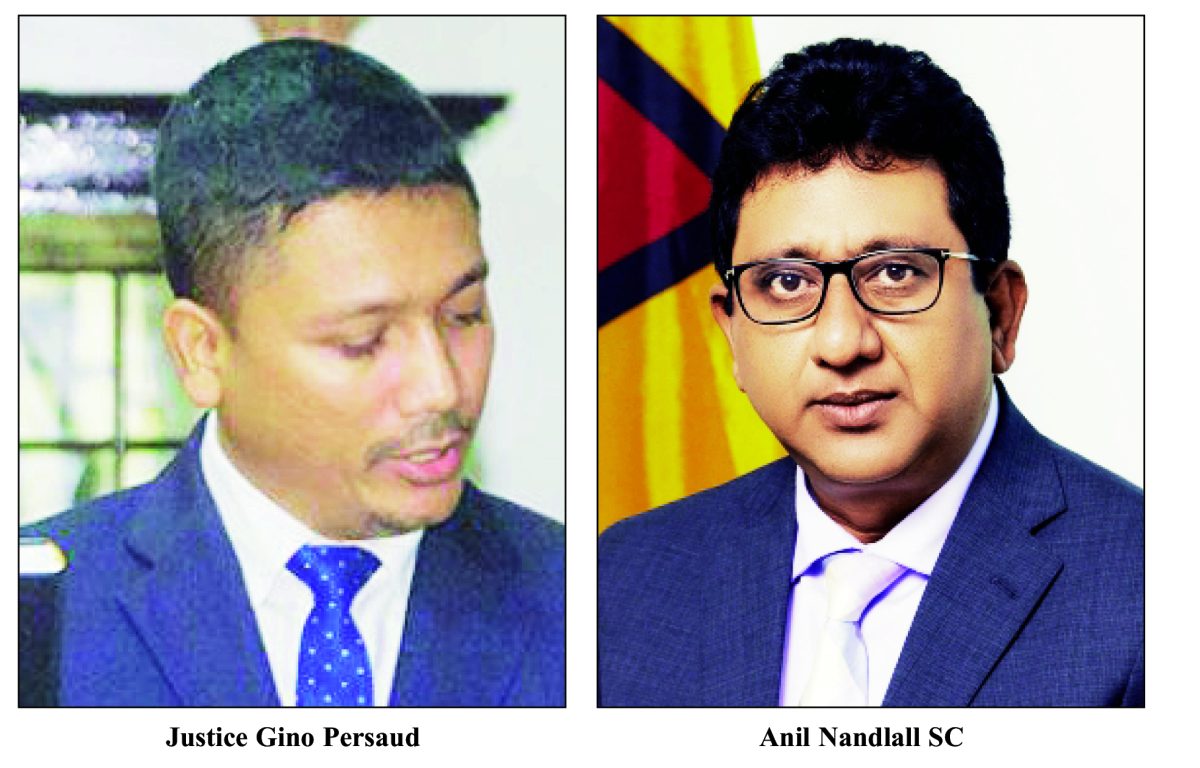Attorney General Anil Nandlall yesterday filed an appeal in the Full Court against Justice Gino Persaud’s ruling in favour of two companies seeking to enforce an arbitral ruling against Venezue-lan oil company, PDVSA, asking that the entire judgement be set aside since among other things it likely to affect the national security and national sovereignty of Guyana.
In his appeal the Attorney General also asked the that the respondents, whom he listed as ConocoPhillips Petrozuata BV, Venezuela Limited and ConocoPhillips Petrozuata BV, and PDVSA, Corpoguanipa and PDVSA Petroleo, be ordered to pay the costs in both the Full Court and the lower court.
Judge Persaud’s ruling had its genesis in an application by Phillips Petroleum Company Venezuela Limited and ConocoPhillips Petrozuata BV for the enforcement here of a 2019 arbitral ruling against PDVSA, Corpoguanipa and PDVSA Petroleo. Similar applications have been made in other Caribbean jurisdictions and granted. PDVSA has had years of commercial transactions with the Guyana Government and payments remain outstanding to it.
In his ruling, Justice Persaud said that he was satisfied on a balance of probabilities that the applicants are entitled at common law to have the arbitral award recognised and judgement entered in its favour in terms of the award and to have it enforced in Guyana.
He averred that the right to enforce an arbitral award at common law is well established and arises from the implied promise to pay the award that emanates from the arbitration agreement.
He pointed out that a foreign arbitral award will be enforced at common law if the award is (a) in accordance with an agreement to arbitrate which is valid by its applicable law, and (b) valid and final according to the law governing the arbitration proceedings.
However, in his grounds for appeal the Attorney General argued that Justice Persaud’s ruling was misconceived and erroneous in law and contrary to and in contravention of the provisions of section 28 of the Arbitration Act, Chap 7:03.
Further, the appeal further submitted that the ruling was “wrong, erroneous, and insofar as it fails to take into account and/or fails to properly take into account the effect and purport of the provisions of section 28 of the Arbitration Act, Chap. 7:03 and/or at all”.
According to the Attorney General, the recent ruling was also contrary to, in breach of, and contravenes the public policy of Guyana, contrary to, and in abrogation of, the doctrine of separation of powers, and accordingly, unconstitutional, unlawful, null, void, and of no effect.
The decision as well, according to the attorney-general, was without and in excess of jurisdiction, null, void, and of no effect and affects or likely to affect the national security and national sovereignty of Guyana.
Justice Persaud, according to the appeal, failed to take into account relevant considerations and took into account irrelevant considerations which have rendered his decision erroneous and wrong and his ruling violates, contravenes and/or is likely to violate and contravene the sovereign immunity of Guyana.
A tenth ground for the appeal argued that the property intended to be the subject of enforcement pursuant to the order was lawfully incapable of being the subject of such enforcement and further, and in the alternative the judge erred and misdirected himself on the law by the method used to calculate the interest on the sum that is purportedly the subject of the enforcing award.
It was also submitted that the Arbitral Award dated 29 July 2019 made by the arbitral tribunal in the matter of ICC Case No. 22527/ASM/JPA between the ConocoPhillips Petrozuata BV and Venezuela Limited and ConocoPhillips Petrozuata BV, was neither recognisable, registrable nor enforceable under the laws of Guyana and/or the Supreme Court of Guyana.
In his July 26th 2024 ruling Justice Persaud had also remonstrated with the AG for what was seen as a “veiled threat to the independence of the judiciary designed to intimidate the court”.
Addressing objections by the AG, Justice Persaud had said, “I do not agree with the public policy argument as articulated and advanced by the Attorney General and this argument cannot be relied upon to defeat the applicant’s enforcement application. I do not accept that recognition and enforcement of the Award would be contrary to public policy within the parameters argued by the Attorney General. This argument is misconceived.
“The respondents submitted to, participated in and were represented throughout the arbitration and the arbitral award was delivered to the parties on 2nd August, 2019. The respondents were ordered to be served by me of these enforcement proceedings and having been satisfied that they were properly served the respondents opted not to contest these proceedings.
“The notions submitted by the AG in writing at paragraphs 69 and 71 of his submissions that if I were to recognise the Award it would be wholly offensive and expose the court in the minds of the Guyanese people to allegations of unpatriotic and anti-nationalist conduct is an offensive submission if not a veiled threat to the independence of the judiciary designed to intimidate the court. The AG is not the legal guardian of the minds of the Guyanese people. It is an opportunistic political argument perhaps best suited to the hustings of an elections campaign than a sound legal argument suitable for court. It is most unfortunate, disrespectful and should have been withdrawn. No practitioner (whether a novitiate recently admitted to the Bar or the Leader of the Bar) should ever accuse a sitting judge of unpatriotic and anti-nationalist conduct moreover to reduce it into writing,” the judge had declared.





